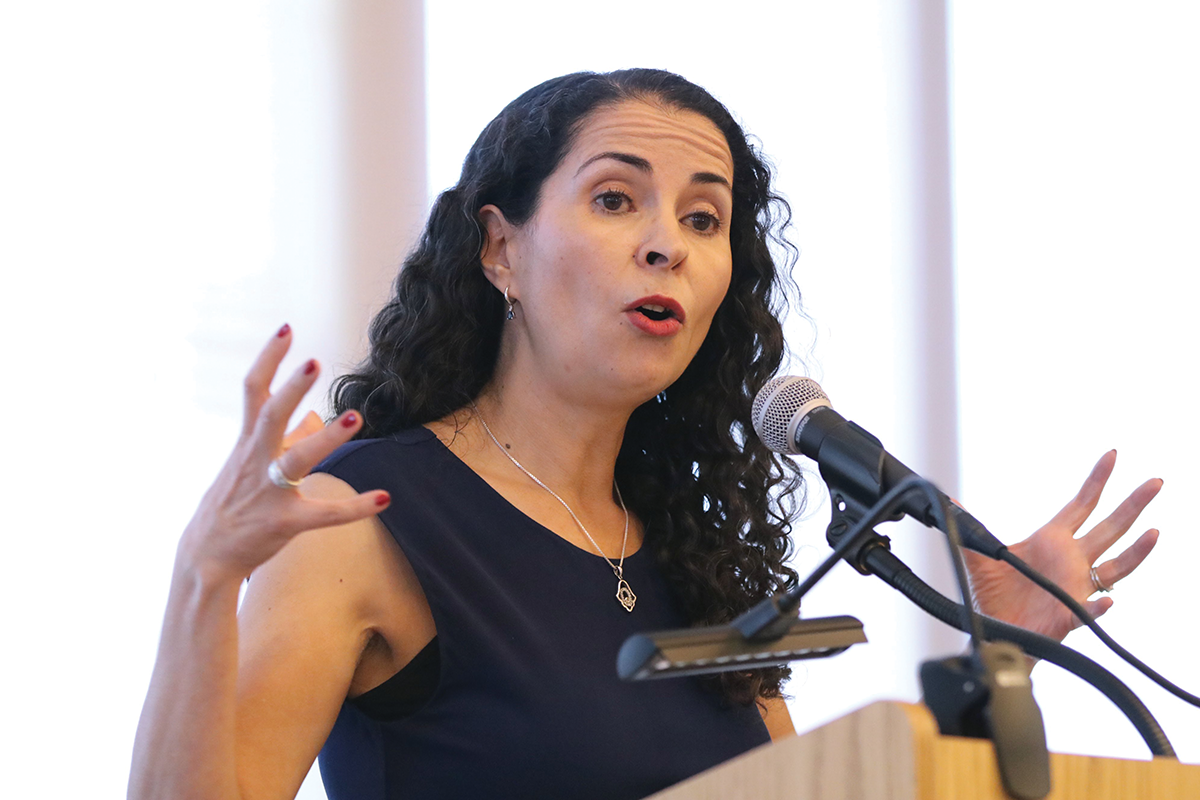
Reported by Alice Evans
Held April 25 and built around the experience and expertise of Moroccan-born writer Laila Lalami, the 7th annual CSWS Northwest Women Writers Symposium featured a panel discussion on the UO campus and a keynote talk at the downtown Eugene Public Library. The theme, “The Border and Its Meaning: Forgotten Stories,” was meant to open conversations about Muslim life in the West and the plight of undocumented immigrants in the U.S. and around the world. A columnist for The Nation and a regular contributor to other prominent publications, Lalami often focuses on border issues in northern Africa and around the Mediterranean area, as well as in the United States. The author of three novels, her most recent is The Moor’s Account, a Pulitzer Prize finalist in 2015.
The Moor’s Account opened the conversation further, to a historic look at an ill-fated expedition of Spanish conquistadors (recorded officially by Cabeza De Vaca) and their interactions with Native Americans as they traveled from Florida into northern Mexico. Lalami’s novel is an imagined memoir written in the voice of one of four survivors of the expedition, a Moorish slave considered the first black explorer of America. When juxtaposed against De Vaca’s historic record of this journey, Lalami’s novel, as The Huffington Post puts it, “sheds light on all of the possible New World exploration stories that didn’t make history.” One of the ongoing themes of the novel relates to the power of voice, the significance of storytelling, and the relationship of personal freedom to storytelling.
The day began with a simple reception in Lalami’s honor, hosted at the Ford Lecture Hall in JSMA. Following the reception, a panel of UO scholars gathered to discuss passages they had selected from The Moor’s Account. Commentators included Liz Bohls, Miriam Gershow, Angela Joya, Lamia Karim, and Michael Najjar. The panel was structured around their passages, with Lalami reading the text of each, followed by the commentary of the individual who selected it.
Miriam Gershow, MFA, novelist and associate director of composition, Department of English, started things off by focusing on how Lalami built the backstory of her main character. See opposite page for her detailed commentary.
Liz Bohls, PhD, professor, Department of English, chose to comment on a passage near the end of the novel, after the four survivors of the Spanish expedition have crossed the North American continent and arrived in New Spain. She discussed “the novel as a story of travel, slavery, empire, and colonialism, in which the protagonist undergoes a number of personal transformations, starting in Morocco and ending somewhere in the Southwest. I’m particularly interested,” she said, “in his transitions from free to enslaved and back again, and his ‘Moorish’ identity that enables him to observe the Castilian conquistadors’ actions as an outsider. His sense of his identity shifts as he moves among the various groups, Spanish and Indians, belonging to neither. ‘Who was I in New Spain?’ he asks.” See opposite page for her detailed commentary.
Angela Joya, PhD, assistant professor, Department of International Studies, whose current research focuses on the current migrant/refugee crisis in the Mediterranean, commented on a passage in which Mustafa sells himself into slavery in the hope of saving the lives of his mother, brothers, and sister. Michael Najjar, MFA, PhD, associate professor, Department of Theatre Arts, whose passage selection overlapped with Joya’s, discussed “how Lalami humanized the Moor al-Zamoria, and how Moors have traditionally been erased in theatre, especially in plays by William Shakespeare and Aphra Behn.” Lamia Karim, PhD, associate professor, Department of Anthropology, chose a passage that described the meeting between the main character and Oyomasot, the Native woman whom he marries. Karim commented: “The body of the female in colonial imagination is an interesting idea to explore. Oyomasot is a bold character in a land that is increasingly being plundered and lost.”
About 75 people attended the panel discussion, including a mix of faculty, staff, students, and visitors from the outlying community. The evening keynote at Eugene Public Library drew about 150 people. Sponsored by the Center for the Study of Women in Society, in cooperation with the Eugene Public Library, the symposium was cosponsored by the Oregon Humanities Center’s Endowment for Public Outreach in the Arts, Sciences, and Humanities; UO Libraries; CAS Humanities; Departments of English and Women’s, Gender and Sexuality Studies; School of Journalism and Communication; Center for Latino/a and Latin American Studies; and the Wayne Morse Center for Law & Politics.
— reported by Alice Evans, NWWS initiator & coordinator 2011-2018

